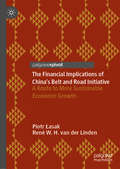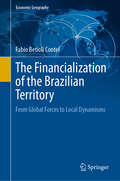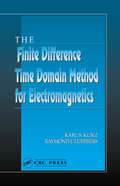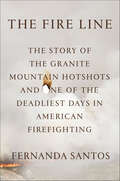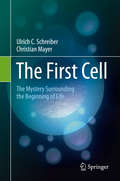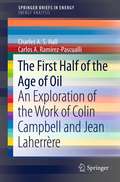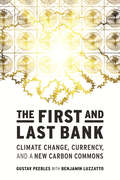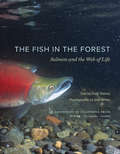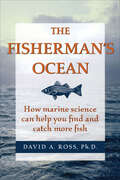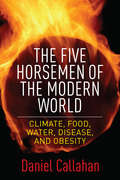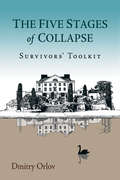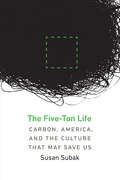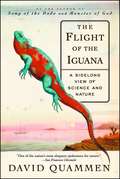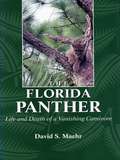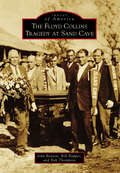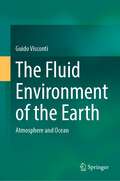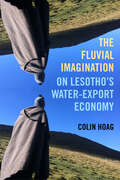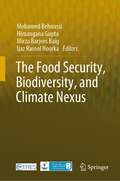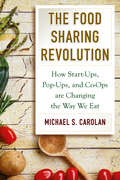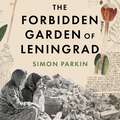- Table View
- List View
The Financial Implications of China’s Belt and Road Initiative: A Route to More Sustainable Economic Growth
by Piotr Łasak René W.H. van der LindenThis book systematically discusses the contribution of the Belt and Road Initiative (BRI) to China’s transition from an emerging to an advanced economic and financial system after more than five years. From a historical perspective, it explains to what extent the BRI plan is effective enough to help China bounce back from its economic slowdown and the financial implications in a policy trilemma context. Further, it investigates both the rationale of the BRI and its pitfalls, focusing on the various options for financing the project based on the Mundell & Fleming model. The book also analyses the impact of the BRI as well as possible policy options to deal with China’s policy trilemma in a structurally more balanced “new normal” economic growth model. Lastly, it reviews the financial stability issues concerning liberalization policies in China.
The Financialization of the Brazilian Territory: From Global Forces to Local Dynamisms (Economic Geography)
by Fabio Betioli ContelThe book analyzes the financialization of the Brazilian territory to identify its main actors, technical systems and processes. The work is divided into three parts, which correspond to the three main scales of analysis of the national financial system: 1. the global scale, which defines the relative position of Brazil in the international division of financial work, emphasizing the role of São Paulo as an international financial centre; 2 the national level, which demonstrates the recent development of the financial and banking system (after 1964), with emphasis on the location and regionalization of bank headquarters and branches, as well as the new electronic channels for the provision of banking services (ATMs, points-of-sales, mobile and Internet banking); and 3. the local scale, which shows how these new financial agents and technical systems affect the Brazilian urban population, emphasizing the indebtedness of the lower income classes, as well as the emergence of alternative ways of using finance, such as fintechs, credit cooperatives and community banks.
The Finest Hours: The True Story of the U.S. Coast Guard's Most Daring Sea Rescue (True Rescue Chapter Bks.)
by Casey Sherman Michael J. TougiasThe story behind the major motion picture from Disney—starring Chris Pine, Eric Bana, and Casey Affleck—written by a recognized master of the genre—&“a blockbuster account of tragedy at sea&” (The Providence Journal).It&’s the winter of 1952 and a ferocious Nor&’easter is pounding New England with howling winds and seventy-foot seas. Two oil tankers get caught in the violent storm off Cape Cod, its fury splitting the massive ships in two. Back on shore are four young Coast Guardsmen who are given a suicide mission. They must save the lives of the seamen left stranded in the killer storm, and they have to do it in a tiny lifeboat. The crew is led by Bernie Webber, who has to rely on prayer and the courage of his three crewmembers to pull off the impossible. As Webber and his crew sail into the teeth of the storm, each man comes to the realization that he may not come back alive. They&’ve lost all navigation and have no idea where the stranded seaman are, and have no idea how to get back home. Whether by sheer luck or divine intervention, the crew stumbles upon the wounded ship in the darkness. More than thirty men appear at the railings of the SS Pendleton, all hoping to be saved. Once again, Webber and his crew face a daunting challenge. How can they rescue all these men with their tiny lifeboat? Dripping with suspense and high-stakes human drama, The Finest Hours has incredible and astonishing true-to-life heroism and action-packed rescue scenes. This &“marvelous and terrifying yarn&” (Los Angeles Times) &“deserves a place as a classic of survival at sea&” (The Boston Globe).
The Finite Difference Time Domain Method for Electromagnetics
by Karl S. Kunz Raymond J. LuebbersThe Finite-Difference Time-domain (FDTD) method allows you to compute electromagnetic interaction for complex problem geometries with ease. The simplicity of the approach coupled with its far-reaching usefulness, create the powerful, popular method presented in The Finite Difference Time Domain Method for Electromagnetics. This volume offers timeless applications and formulations you can use to treat virtually any material type and geometry.The Finite Difference Time Domain Method for Electromagnetics explores the mathematical foundations of FDTD, including stability, outer radiation boundary conditions, and different coordinate systems. It covers derivations of FDTD for use with PEC, metal, lossy dielectrics, gyrotropic materials, and anisotropic materials. A number of applications are completely worked out with numerous figures to illustrate the results. It also includes a printed FORTRAN 77 version of the code that implements the technique in three dimensions for lossy dielectric materials. There are many methods for analyzing electromagnetic interactions for problem geometries. With The Finite Difference Time Domain Method for Electromagnetics, you will learn the simplest, most useful of these methods, from the basics through to the practical applications.
The Finite-Difference Modelling of Earthquake Motions
by Peter Moczo Jozef Kristek Martin Galis Miriam Kristekova Emmanuel Chaljub Martin Käser Peter Klin Christian Pelties Peter Moczo Jozef Kristek Martin Galis Miriam Kristekova Emmanuel Chaljub Martin Käser Peter KlinAmong all the numerical methods in seismology, the finite-difference (FD) technique provides the best balance of accuracy and computational efficiency. This book offers a comprehensive introduction to FD and its applications to earthquake motion. Using a systematic tutorial approach, the book requires only undergraduate degree-level mathematics and provides a user-friendly explanation of the relevant theory. It explains FD schemes for solving wave equations and elastodynamic equations of motion in heterogeneous media, and provides an introduction to the rheology of viscoelastic and elastoplastic media. It also presents an advanced FD time-domain method for efficient numerical simulations of earthquake ground motion in realistic complex models of local surface sedimentary structures. Accompanied by a suite of online resources to help put the theory into practice, this is a vital resource for professionals and academic researchers using numerical seismological techniques, and graduate students in earthquake seismology, computational and numerical modelling, and applied mathematics.
The Fire Line: The Story of the Granite Mountain Hotshots and One of the Deadliest Days in American Firefighting
by Fernanda Santos“In Fernanda Santos’ expert hands, the story of 19 men and a raging wildfire unfolds as a riveting, pulse-pounding account of an American tragedy; and also as a meditation on manhood, brotherhood and family love. The Fire Line is a great and deeply moving book about courageous men and women.”- Héctor Tobar, author of Deep Down Dark: The Untold Stories of 33 Men Buried in a Chilean Mine and the Miracle that Set Them Free.When a bolt of lightning ignited a hilltop in the sleepy town of Yarnell, Arizona, in June of 2013, setting off a blaze that would grow into one of the deadliest fires in American history, the twenty men who made up the Granite Mountain Hotshots sprang into action. An elite crew trained to combat the most challenging wildfires, the Granite Mountain Hotshots were a ragtag family, crisscrossing the American West and wherever else the fires took them. The Hotshots were loyal to one another and dedicated to the tough job they had. There's Eric Marsh, their devoted and demanding superintendent who turned his own personal demons into lessons he used to mold, train and guide his crew; Jesse Steed, their captain, a former Marine, a beast on the fire line and a family man who wasn’t afraid to say “I love you” to the firemen he led; Andrew Ashcraft, a team leader still in his 20s who struggled to balance his love for his beautiful wife and four children and his passion for fighting wildfires. We see this band of brothers at work, at play and at home, until a fire that burned in their own backyards leads to a national tragedy.Impeccably researched, drawing upon more than a hundred hours of interviews with the firefighters’ families, colleagues, state and federal officials, and fire historians and researchers, New York Times Phoenix Bureau Chief Fernanda Santos has written a riveting, pulse-pounding narrative of an unthinkable disaster, a remarkable group of men and the raging wildfires that threaten our country’s treasured wild lands.The Fire Line is the winner of the 2017 Spur Award for Best First Nonfiction Book, and Spur Award Finalist for Best Western Contemporary Nonfiction.
The First Cell: The Mystery Surrounding the Beginning of Life
by Christian Mayer Ulrich C. SchreiberThis book introduces a fresh perspective on the conditions for the genesis of the first cell. An important possible environment of the prehistoric Earth has long been overlooked as a host to the perfect biochemical conditions for this process. The first complexes of continental crust on the early Earth must have already contained systems of interconnected cracks and cavities, which were filled with volatiles like water, carbon dioxide and nitrogen. This book offers insights into how these conditions may have provided the ideal physical and chemical setting for the formation of protocells and early stages of life.The authors support their hypothesis with a number of astonishing findings from laboratory experiments focusing on a variety of organic compounds, and on the formation of key cellular ingredients and of primitive cell-like structures. Moreover, they discuss the principles of prebiotic evolution regarding the aspects of order and complexity. Guiding readers through various stages of hypotheses and re-created evolutionary processes, the book is enriched with personal remarks and experiences throughout, reflecting the authors' personal quest to solve the mystery surrounding the first cell.
The First Half of the Age of Oil
by Charles A. Hall Carlos A. Ramírez-PascualliAccording to the conventional wisdom, we live in a post-industrial information age. This book, however, paints a different picture: We live in the age of oil. Petroleum fuels and feedstocks are responsible for much of what we take for granted in modern society, from chemical products such as fertilizer and plastics, to the energy that moves people and goods in a global economy. Oil is a nearly perfect fuel: Energy dense, safe to store, easy to transport, and mostly environmentally benign. Most importantly, oil has been cheap and abundant during the past 150 years. In 1998, two respected geologists, Colin Campbell and Jean Laherrère, published a detailed article announcing that the "end of cheap oil" would happen before 2010, which meant that the world would face a peak, or at least a plateau, in global daily oil production in the first decade of the new millennium. Today, two billion people under the age of 14 have lived the majority of their lives past the point when this century-long growth in oil supplies came to an end, which also marks the end of the first half of the age of oil. This transition has ushered in a new reality of high oil prices, stagnating oil supplies, and sluggish economies. In this book, a leading authority on energy explores the contributions and continuing legacy of Colin Campbell and Jean Laherrère, the two geologists who modified the terms of the debate about oil. The book provides a unique perspective and state-of-the-art overview of today's energy reality and its enormous economic and social implications. - Covers a topic that eclipses climate change as the most important but least understood challenge for contemporary society - Explores the works of Colin Campbell and Jean Laherrère, the leading authorities in the field of Peak Oil, authors of "The End of Cheap Oil" (Scientific American, 1998), and founding members of the Association for the Study of Peak Oil & Gas - Addresses a broad audience of scientists, engineers, and economists in a format that is accessible to the general public - Provides a complete overview of the basic geological, chemical, physical, economic and historical concepts that every oil consumer should understand - Presents the latest information on oil production, reserves, discoveries, prices, and fields in easy-to-understand graphs and plots
The First Snowfall
by Anne RockwellLet the snowflakes fall! Enjoy a cold-weather adventure in this updated classic from the author of Apples and Pumpkins. Snow falls and falls all through the night. And when morning comes, it’s time for fun! Watch the snowplows sweep the streets. Shovel walkways! Build a snowman! Sled! Ski! There are so many wonderful things to do in this magical snow-covered world! This updated edition of a wintry favorite includes new jacket art from Lizzy Rockwell and refreshed interior art and design.
The First and Last Bank: Climate Change, Currency, and a New Carbon Commons (One Planet)
by Gustav PeeblesA groundbreaking approach to currency and community that may allow us to seize carbon from the atmosphere—and offer a new tool in the fight against climate change.Through the ages, currencies have been based on all manner of objects—from tobacco leaves to salt to gold to collateralized debt obligations. The only thing that this odd assortment of objects shares is the communal belief that these objects could harness and direct economic growth—that they are, in a sense, fertile. In The First and Last Bank, Gustav Peebles and Benjamin Luzzatto propose that atmospheric carbon could be seen anew as fertile in this same sense. In other words, carbon, rather than loom as waste in our skies, could instead be &“drawn down&” to the earth by millions of currency users and the communally owned banks they rely on, where it could serve as a foundation of new biological life.Seeing currency as a powerful tool for collective action, the authors argue that dovetailing developments in digital currencies and the biosequestration of carbon have, together, made a new and radical intervention in the climate battle possible: a nonproprietary currency backed by sequestered carbon. This new currency would be managed via Wikipedia-style open-source policies that privilege sustainability and equity over endless growth and pollution. Because it is backed by sequestered carbon, the use of the currency would draw gaseous carbon out of the atmosphere and push it back into the ground, following the exact same trajectory as gold during the era of the international gold standard. While it is no silver bullet, such a currency would act as a necessary complement to wide-scale mitigation efforts, at the same time engaging ordinary citizens in the fight to reduce the dangerous levels of carbon in our atmosphere.
The Fish in the Forest
by Dale StokesThe Fish in the Forest is an elegantly written, beautifully illustrated exploration of the complex web of relationships between the salmon of the Pacific Northwest and the surrounding ecosystem. Dale Stokes shows how nearly all aspects of this fragile ecosystem--from streambeds to treetops, from sea urchins to orcas to bears, from rain forests to kelp forests--are intimately linked with the biology of the Pacific salmon. Illustrated with 70 stunning color photographs by Doc White, The Fish in the Forest demonstrates how the cycling of nutrients between the ocean and the land, mediated by the life and death of the salmon, is not only key to understanding the landscape of the north Pacific coast, but is also a powerful metaphor for all of life on earth.
The Fisherman's Ocean: How Marine Science Can Help You Find and Catch More Fish
by David A Ross PhDThis volume &“clearly explains how marine science can help saltwater anglers catch more and bigger fish . . . comprehensive yet accessible&” (Booklist). Here at last, in layman&’s terms, is a fisherman's guide to the habitat and behavior of saltwater fish. The author, an oceanographer and avid fly fisherman, explains the marine environment and the factors that affect where game fish congregate—everything from how they move with tides and currents to what they see, smell, taste, and hear. The copiously illustrated text covers inshore and offshore habitat and will prove invaluable to anyone who fishes in saltwater, whether in the surf, on the flats, or out at sea. The ocean is vast. It pays to be educated.
The Five Horsemen of the Modern World: Climate, Food, Water, Disease, and Obesity
by Daniel CallahanIn recent decades, we have seen five perilous and interlocking trends dominate global discourse: irreversible climate change, extreme food and water shortages, rising chronic illnesses, and rampant obesity. Why can't we make any progress in counteracting these problems despite vast expenditures of intellectual, institutional, and social capital? What makes these global emergencies the "wicked problems" that resist our best efforts and only grow more daunting?Daniel Callahan, noted author and the nation's preeminent scholar in bioethics, examines these global problems and shines a light on the institutions, practices, and actors that block major change. We see partisan political and ideological forces, old-fashioned hucksters, and trumped-up scientific disagreements but also the problem of modern progress itself. Obesity, anthropogenic climate change, degenerative diseases, ecological degradation, and global famine are often the unintended consequences of unchecked industrial growth, insatiable eating habits, and technologically extended life spans. Only through well-crafted political, regulatory, industrial, and cultural counterstrategies can we change enough minds to check these threats. With big thinking on issues that are usually evaluated separately, this book is sure to scramble partisan divides and provoke unusual, heated debate.
The Five Stages of Collapse
by Dmitry OrlovIn the face of political impotence, looming resource depletion, and catastrophic climate change, many of us have become reconciled to an uncertain future. However, popular perception of how this future might actually unfold varies wildly from "a severe and prolonged recession," to James Howard Kunstler's "long emergency," to the complete breakdown of civilization. In The Five Stages of Collapse, Dmitry Orlov posits a taxonomy of collapse, offering a surprisingly optimistic perspective on surviving the sweeping changes of the day with health and sanity intact.Arguing that it is during periods of disruption and extreme uncertainty that broad cultural change becomes possible, Orlov steers the reader through the challenges of financial, commercial, and political collapse. He suggests that if the first three stages are met with the appropriate responses, further breakdown may be arrested before the extremes of social and cultural collapse are reached.Drawing on a detailed examination of post-collapse societies, including the Somali people of Africa, the Pashtuns of Afghanistan, the Roma of Central and Eastern Europe, and even the Russian mafia, The Five Stages of Collapse describes successful adaptations in areas such as finance, self-governance, and social and cultural organization. These fascinating case studies provide a unique perspective on the characteristics that determine highly resilient communities. Shot through with Orlov's trademark dark humor, this is an invaluable toolkit for creating workable post-collapse solutions.Dmitry Orlov was born in Leningrad, Russia, and immigrated to the United States. He is the author of Reinventing Collapse and maintains the phenomenally popular blog Club Orlov.
The Five-Ton Life: Carbon, America, and the Culture That May Save Us (Our Sustainable Future)
by Susan SubakAt nearly twenty tons per person, American carbon dioxide emissions are among the highest in the world. Not every American fits this statistic, however. Across the country there are urban neighborhoods, suburbs, rural areas, and commercial institutions that have drastically lower carbon footprints. These exceptional places, as it turns out, are neither “poor” nor technologically advanced. Their low emissions are due to culture. In The Five-Ton Life, Susan Subak uses previously untapped sources to discover and explore various low-carbon locations. In Washington DC, Chicago suburbs, lower Manhattan, and Amish settlements in Lancaster County, Pennsylvania, she examines the built and social environment to discern the characteristics that contribute to lower greenhouse-gas emissions. The most decisive factors that decrease energy use are a commitment to small interiors and social cohesion, although each example exhibits its own dynamics and offers its own lessons for the rest of the country. Bringing a fresh approach to the quandary of American household consumption, Subak’s groundbreaking research provides many pathways toward a future that is inspiring and rooted in America’s own traditions.
The Flight of the Iguana: A Sidelong View of Science and Nature
by David QuammenFrom the award-winning author of The Tangled Tree and The Song of the Dodo comes a collection of essays in which various weird and wonderful aspects of nature are examined.From tales of vegetarian piranha fish and voiceless dogs to the scientific search for the genes that threaten to destroy the cheetah, Quammen captures the natural world with precision. Throughout, he illuminates the surprising intricacies of the natural world, and our human attitudes towards those intricacies. A distinguished essayist, Quammen&’s reporting is masterful and thought provoking and his curiosity and fascination with the world of living things is infectious.
The Flightless Traveller: 50 modern adventures by land, river and sea
by Emma GreggDiscover how to explore our beautiful world sustainably and responsibly with this trailblazing guide to flight-free travel. Seeking options that are enjoyable and kind to the planet, award-winning travel writer Emma Gregg shows you how to get a no-fly holiday off the ground.The Flightless Traveller presents 50 inspirational, life-affirming trip ideas for those who would like to fly less, or not at all. They include eco-friendly city breaks and coastal retreats, bike rides and sailing voyages, short jaunts on vintage railways and incredible intercontinental journeys.Some shed new light on wonderful, well-known places. Others reveal destinations, activities and experiences you might have never considered before. Best of all, they make the journey an essential part of the adventure.Get ready to recapture the authentic spirit of travel as you plan your next trip by land, river or sea.
The Florida Manatee: Biology and Conservation
by Roger L Reep Robert K BondeMuch of what we know about manatee biology and behavior has been learned in the years after they were first declared an endangered species in 1967. Roger Reep and Robert Bonde have been at the forefront of manatee research for more than two decades. The Florida Manatee offers an engaging, accessible introduction to everything manatee, including communication, diet, long-distance migration, and much more.Publication of the hardcover edition birthed a slew of national newspaper stories on manatee intelligence appearing in publications ranging from the New York Times to the Pittsburgh Post-Gazette as well as dailies throughout Florida. The Florida Manatee is perfect for anyone seeking the most comprehensive, up-to-date information on this fascinating marine mammal.
The Florida Panther: Life And Death Of A Vanishing Carnivore
by David MaehrWhen the first field study of the Florida panther took place in 1973, so little was known about the animal that many scientists believed it was already extinct. During more extensive research conducted from 1981 to 1986, panthers were proven to exist, but the handful of senile, anemic, and parasite-infested specimens that were captured indicated a grim future. During those early years a remarkably enduring image of the panther was born, and despite voluminous data gathered over the next decade that showed the panther to be healthy, long-lived, and reproducing, that earlier image has yet to be dispelled. For nine years, biologist David S. Maehr served as project leader of the Florida Panther Study Project, helping to gather much of the later, surprisingly positive data. In The Florida Panther, he presents the first detailed portrait of the animal -- its biology, natural history, and current status -- and a realistic assessment of its prospects for survival. Maehr also provides an intriguing look at the life and work of a field biologist: how captures are made, the intricacies of radio-telemetry tracking, the roles of various team members. He describes the devastating intrusion of politics into scientific work and examines controversial efforts to establish a captive breeding program and to manipulate the Florida panther's genetic stock with the introduction of relatives from west Texas. Protection of high-quality habitat, much of it in the hands of private landowners, is the key to the long-term survival of the Florida panther. Unless agency decisionmakers and the public are aware of the panther's true situation, little can be done to save it. This book will play a vital role in correcting widespread misconceptions about the panther's current condition and threats to its survival.
The Floyd Collins Tragedy at Sand Cave (Images of America)
by John Benton Bob Thompson Bill NapperFloyd Collins is perhaps the most famous person you have probably never heard of. Collins was a Kentucky cave explorer who was trapped for more than two weeks during the winter of 1925 in a cave located within the boundaries of what is now Mammoth Cave National Park. Collins had no fear of exploring the most difficult cave passages, and few people could match his persistence and endurance. The story of Floyd Collins becoming trapped, then buried alive, and ultimately dying alone in a cave held a powerful grip on the hearts and minds of people the world over. The resulting media coverage put Mammoth Cave on the map and helped usher the actual designation of Mammoth Cave as a national park. His explorations laid the foundation for others to later discover that Mammoth Cave was the longest cave in the world.
The Fluid Environment of the Earth: Atmosphere and Ocean
by Guido ViscontiThe book is conceived at two levels. An introductory one intended for undergraduate and/or environmental studies students and the other (in the appendix) for advanced students (graduate). The book is different from others on the same subject which are either too descriptive or too much specialized. Beside there are large sections on biogeochemistry not usually found in other textbooks. Whenever possible an approach based on entropy considerations is introduced. The book includes a quite classical introduction to the thermodynamics of ocean and atmosphere, then the circulation of the ocean and atmosphere, the connection climate-chemistry with main emphasis on the carbon dioxide problem. The chemistry is also considered in connection with the polluted atmosphere and ocean and particulate in the atmosphere . A chapter is dedicated to the biogeochemical cycles which are solved both with the integration of a system of equations or matrix algebra. An original chapter is dedicated to sea-atmosphere interactions which includes the monsoons meteorology, hurricanes and the ENSO phenomena. Finally a concise description of the fluid environments in the Solar System is given.
The Fluvial Imagination: On Lesotho's Water-Export Economy (Critical Environments: Nature, Science, and Politics #12)
by Colin HoagA free open access ebook is available upon publication. Learn more at www.luminosoa.org. Landlocked and surrounded by South Africa on all sides, the mountain kingdom of Lesotho became the world's first "water-exporting country" when it signed a 1986 treaty with its powerful neighbor. An elaborate network of dams and tunnels now carries water to Johannesburg, the subcontinent's water-stressed economic epicenter. Hopes that receipts from water sales could improve Lesotho's fortunes, however, have clashed with fears that soil erosion from overgrazing livestock could fill its reservoirs with sediment. In this wide-ranging and deeply researched book, Colin Hoag shows how producing water commodities incites a fluvial imagination. Engineering water security for urban South Africa draws attention ever further into Lesotho's rural upstream catchments: from reservoirs to the soils and vegetation above them, and even to the social lives of herders at remote livestock posts. As we enter our planet's water-export era, Lesotho exposes the possibilities and perils ahead.
The Food Security, Biodiversity, and Climate Nexus
by Mohamed Behnassi Himangana Gupta Mirza Barjees Baig Ijaz Rasool NoorkaThis volume is the outcome of an international cooperation between 73 scientists, experts, and practitioners from many countries, disciplines, and professional areas. As a part of a series of CERES publications, the volume attempts to contribute to the scientific debate about the food–biodiversity–climate nexus by developing a comprehensive region-specific and broader global understanding of the linkages between these areas, especially in the context of Global South. Instead of providing only modern science-based solutions for the nexus related challenges, the volume covers case studies that present mixed solutions, offering the use of traditional ecological knowledge in combination with modern science for both resilience and sustainability. This is increasingly instrumental in shaping the needed response options regarding the economic, social, and environmental future of the world. Based on a multi-regional and cross-sectoral analysis, the approach consists of: assessing the different natural and anthropogenic factors currently affecting ecosystems and their services, especially the impacts of climate change; highlighting the different linkages between the state of biodiversity and food systems in many contexts and scales; and exploring the various response mechanisms to effectively manage the implications of such linkages. Most chapters provide inputs for future relevant research and policy agendas.
The Food Sharing Revolution: How Start-Ups, Pop-Ups, and Co-Ops are Changing the Way We Eat
by Michael S. CarolanMarvin is a contract hog farmer in Iowa. He owns his land, his barn, his tractor, and his animal crates. He has seen profits drop steadily for the last twenty years and feels trapped. Josh is a dairy farmer on a cooperative in Massachusetts. He doesn't own his cows, his land, his seed, or even all of his equipment. Josh has a healthy income and feels like he's made it.In The Food Sharing Revolution, Michael Carolan tells the stories of traditional producers like Marvin, who are being squeezed by big agribusiness, and entrepreneurs like Josh, who are bucking the corporate food system. The difference is Josh has eschewed the burdens of individual ownership and is tapping into the sharing economy.Josh and many others are sharing tractors, seeds, kitchen space, their homes, and their cultures. They are business owners like Dorothy, who opened her bakery with the help of a no-interest, crowd-sourced loan. They are chefs like Camilla, who introduces diners to her native Colombian cuisine through peer-to-peer meal sharing. Their success is not only good for aspiring producers, but for everyone who wants an alternative to monocrops and processed foods.The key to successful sharing, Carolan shows, is actually sharing. He warns that food, just like taxis or hotels, can be co-opted by moneyed interests. But when collaboration is genuine, the sharing economy can offer both producers and eaters freedom, even sovereignty. The result is a healthier, more sustainable, and more ethical way to eat.
The Forbidden Garden of Leningrad: A True Story of Science and Sacrifice in a City under Siege
by Simon ParkinFrom the winner of the 2023 Wingate Literary Prize comes a fascinating and moving untold story of the Leningrad scientists who risked everything for the future of humanity"An astonishing story brilliantly told... It is as moving as it is gripping to read"Jonathan Dimbleby, author of Endgame: 1944"A gripping, original and important story of courage and science in wartime" Roland Philipps, author of A Spy Named OrphanIn the summer of 1941, German troops surrounded the Russian city of Leningrad - now St Petersburg - and began the longest blockade in recorded history. By the most conservative estimates, the siege would claim the lives of three-quarters of a million people. Most died of starvation.At the centre of the embattled city stood a converted palace that housed the greatest living plant library ever amassed - the world's first seed bank. After attempts to evacuate the collection failed, and as supplies dwindled, the scientists responsible faced a terrible decision: should they distribute the specimens to the starving population, or preserve them in the hope that they held the key to ending global famine?Drawing on previously unseen sources, The Forbidden Garden tells the remarkable and moving story of the botanists who remained at the Plant Institute during the darkest days of the siege, risking their lives in the name of science."A beautifully-written account of one of the most extraordinary and little-known episodes of the Second World War -- a scientific feat and act of collective self-sacrifice the consequences of which continue to be felt today."Adam Higginbotham, author of Challenger
